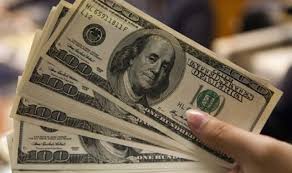Dollar holds firm as growth fears stalk markets

The dollar kept trade-sensitive currencies pinned near multi-year lows on Monday and the euro was under pressure as investors sought safety due to worries about slowing global growth.
Data on Friday showed euro zone inflation surging to another record, adding to the case for the European Central Bank to hike interest rates this month.
While the common currency was steady at $1.0435 on Monday, it is barely above May’s five-year trough of $1.0349 and highlights the market’s preference for dollars as gloom clouds the outlook.
The Australian and New Zealand dollars hit two-year lows on Friday and weren’t far from those levels early in the Asia session, with the Aussie down 0.3% to $0.6796, after falling to as low as $0.6764 on Friday. The kiwi slipped 0.1% to $0.6197.
Trade is likely to be lightened ahead of the Independence Day holiday in the United States.
Safety flows tend to support the greenback, especially at the expense of trade and export-driven currencies, when the world economy is weak. This has kept the dollar elevated even as growth fears have tempered U.S. rate hike expectations.
The U.S. dollar index stood at 105.100, not far below last month’s two-decade high of 105.790. The Atlanta Federal Reserve’s much-watched GDP Now forecast has slid to an annualized -2.1% for the second quarter, implying the country was already in a technical recession.
“The Aussie and other commodity currencies and even euro and sterling will likely decline even more into the week, given markets currently are super-focused on the risk of a sharp slowdown in the global economy,” said Carol Kong, a currency strategist at the Commonwealth Bank of Australia in Sydney.
Sterling hit a two-week low of $1.1976 on Friday and last bought $1.2095.
Ahead this week, Australia’ central bank meets on Tuesday and investors are also awaiting the publication of minutes from last month’s Federal Reserve meeting on Wednesday, and U.S. employment data on Friday.
Markets have priced in a 40 basis point (bp) hike in Australia, so the Aussie may not catch much of a boost if that is delivered.
Minutes of the Fed’s June policy meeting on Wednesday are almost certain to sound hawkish given the committee chose to hike rates by a super-sized 75 bps.
The market is pricing in around an 85% chance of another hike of 75 basis points this month and rates at 3.25-3.5% by year end – before cuts in 2023.
Against Asian currencies the dollar held Friday gains that lifted it to its strongest levels in years on the Thai baht, Indonesian rupiah and Singapore dollar.
The Chinese yuan began the onshore session steady at 6.7021 per dollar.

